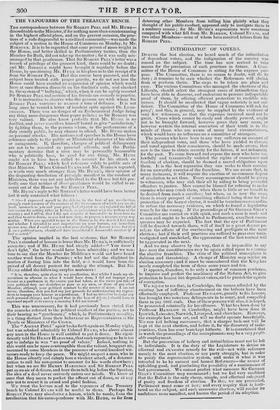INTIMIDATIOY OF VOTERS.
DURING the last election, we heard much of the intimidation of dependent voters, and the indignation of the country was roused on the subject. The time has now arrived to take means for the prevention of such practices in future. A Com- mittee of the House of Commons is sitting for the express pur- pose. .The Committee, there is no reason to doubt, will do its duty; it remains to be seen whether the Reformers will shrink from or perform theirs. The steps to be taken are plain and easy. The various Committees who managed the elections of the Liberals, should select the strongest cases of intimidation they have been able to discover, and endeavour to procure indisputable proof of them, by offering efficient protection to credible wit- nesses. It should be recollected that vague notoriety is not suf- ficient. The Committee of the House of Commons will ask for proqf ; and this, in general, may be supplied by the evidence of very few witnesses, so that the expenses incurred need not be great. Cases which cannot be easily and shortly proved, ought not to be brought forward, however gross they may seem, or however certain the internal conviction of their truth is in the minds of those who are aware of many local circumstances, which would have no influence on a committee of strangers.
The persons who have been in any way sufferers on account of their independent votes, and those who have yielded to threats and voted against their consciences, should be made aware, that now is the time to obtain security for the future, if not indemnity for the past. To come forward and expose the men who have un- lawfully and tyrannically violated the rights of conscience and freedom of election, should be deemed a sacred obligation upon them. It is the best reparation they can make to their country for an unworthy exercise of the franchise. We are aware that, in many instances, it will require the exertion of no common degree of resolution to act thus. Every encouragement should be given to witnesses, who may risk their all by aiding to bring powerful offenders to justice. Men cannot be blamed for refusing to make enemies who may crush them, when there is little or no benefit to be derived from such a sacrifice; but when, as is now the case, there is every prospect of something effectual being done for the protection of the honest elector, it would be treacherous cowardice to refuse the necessary evidence, on which to found a legislative remedy for the wrong. _If the proceedings of Sir GEORGE Canv's Committee are carried on with spirit, and such a case is mad s out as can and ought to be exhibited to Parliament, excellent conse- quences may be expected. The fact that the eye of Parliament will be directed towards them, will of itself in a great degree pa- ralyze the efforts of the overbearing and profligate at the next election ; but if their evil practices are suffered to pass over 'min- vestigated and unrebuked, the oppressions of the last contest will be aggravated in the next.
And we may observe by the way, that it is impossible to say how soon the constituencies may be again called upon to exercise the elective franchise. The state of the political atmosphere is dubious and threatening. A change of Ministry may render an election necessary; and it must be remembered that the King has nearly completed the term of three score years and ten. It appears, therefore, to be only a matter of common prudence, to improve and perfect the machinery of the Reform Act, to give protection to honest but dependent voters,and to punish the agents of corruption.
We rejoice to see that, in Cambridge, the means afforded by the existing law of inflicting chastisement on the bribers have been effectually employed. Professor IIEsssLow, greatly to his honour, has brought two notorious delinquents in to court, and compelled them to pay 500/. each. One of these persons will also, it is hoped, be prosecuted criminally for his offences. IV hat has been done by Professor HENSLOW in Cambridge, might have been done in Ipswich, Leicester, Norwich, Liverpool, and elsewhere. However, the example has been set, and will no doubt operate beneficially. We can tell bribing canvassers, that a sharper look-out will be kept at the next election, and before it, for the discovery of male- practices, than has ever been kept hitherto. It is ascertained that to watch the proceedings of the corruptionists may be a very proj7 t- able employment. But the prevention of bribery and intimidation must not be left to individuals. It is the duty of the Legislature to devise an effectual and extensive remedy for the evil—not with reference merely to the next election, or any party struggle, but M order to purify the representative system, and make it what it was intended to be by earnest and honest Reformers—the means of upholding good, and precluding the possibility of a continuance of bad government. We cannot predict what measure Sir GEORGE GREY'S Committee may recommend ; but we feel very confident that the Ballot is the only cheap, simple, and effectual safeguard of purity and freedom of election. To this, we are persuaded,
Par m i Parliament must come at last; and every inquiry that s insti- tuted on the subject, and each successive election, will render its usefulness more manifest, and hasten the period of its adoption.


























 Previous page
Previous page